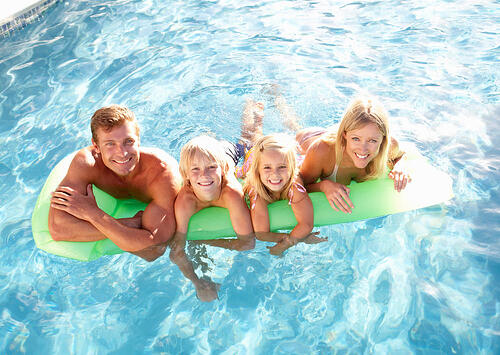If you’re getting ready to purchase a swimming pool heater, you want to do your research to decide which one is going to be the best option for you. That’s what brought you to our page! With so many types of systems, it can become a hassle trying to differentiate between each one. In this article, we’re going to help you compare a solar pool heating system to a gas pool heater, so you can find the best type for your swimming pool.
Gas Pool Heaters
Gas heaters have been the most widely-used method for heating swimming pools. However, their popularity has actually been decreasing in recent years due to higher gas prices and the onset of higher efficiency heat pumps and solar heating. Gas heaters create heat for your pool by burning either natural gas or propane. The gas burns inside something called a combustion chamber, which contains copper coils. As the gas burns, the water passes through the coils and the water is heated.
Advantages:
- Initial inexpensive purchase cost (apx 35% less than solar or heat pumps)
- Operate independently of air temperature
- Heat water rapidly
Disadvantages:
- Very expensive to operate (useful for spas; impractical for pools)
- High maintenance
- No energy efficiency
- Average lifespan of about 5 years
- Not environmentally friendly
- Must plan ahead of time to ensure heater has time to heat up the pool
Solar Pool Heaters
Solar pool heating systems have been growing in popularity as their return-on-investment becomes more widely-known. These heating collectors use solar panels to transfer heat from the sun directly into your pool. The solar panels are placed at a location in your yard, or on your rooftop, where the sun can be harvested the best. As the solar panels collect heat from the sun, the water circulated by your swimming pool pump is diverted through the solar panels before returning to the pool. While traveling through the panels, the water heats up and carries that heat back to the pool.
Advantages:
- Virtually zero operating costs -- no extra pump needed; uses the circulation pump while it’s already filtering the water.
- Maintenance-free
- Solar energy is free
- High energy efficiency
- Environmentally friendly -- emit no air pollution
- Lifespan of about 20 years
- Keeps the pool warm throughout the swim season so the pool is ready when you are
Disadvantages:
- Higher initial purchase price (gas heater is about 35% cheaper than solar up front)
- Won’t work in the dead of winter
Performance & Ideal Use
Gas pool heaters are ideal for quick heating for a short period of time in small bodies of water like spas. Regardless of the weather, you can set and maintain any desired temperature in your pool. Gas heaters are best for pools or spas that aren’t heated regularly because while they’re effective at heating, they’re also very expensive to operate and have a short lifespan.
On the other hand, solar pool heaters are ideal for recreational use. They increase pool temperatures by 7-14 degrees. Solar heaters can be sized to work year-round in southern climates, and they greatly extend the swimming season in northern climates. While they may be initially more expensive to purchase, they’re inexpensive to operate and their lifespan lasts much longer, so your investment may be returned in a relatively short timeframe. Most systems also have a 10-year warranty on the panels. (Our 12-year manufacturer’s warranty at Superior Solar covers the panels against defects and freezing, parts, and labor!) One of the greatest things about solar systems is that during the swim season, they keep the pool warm continuously, so you’re much more likely to use the pool because there’s no preparation or cost of heating.
This solar versus gas pool heater comparison should help you understand better the pros and cons of each selection. Still unsure about which pool heating system is right for your needs? Contact us at Superior Solar today to help you decide on the best option for you!


